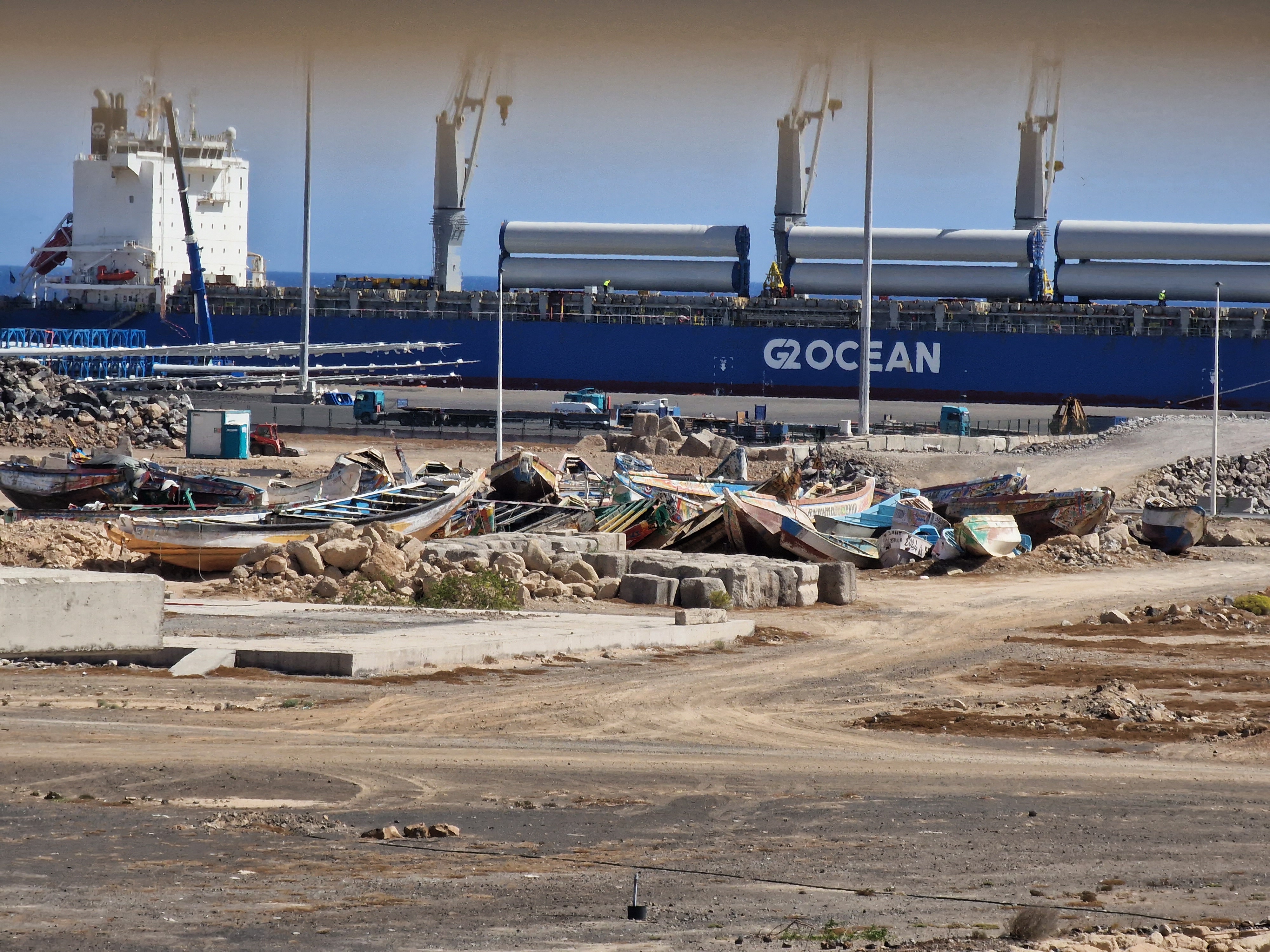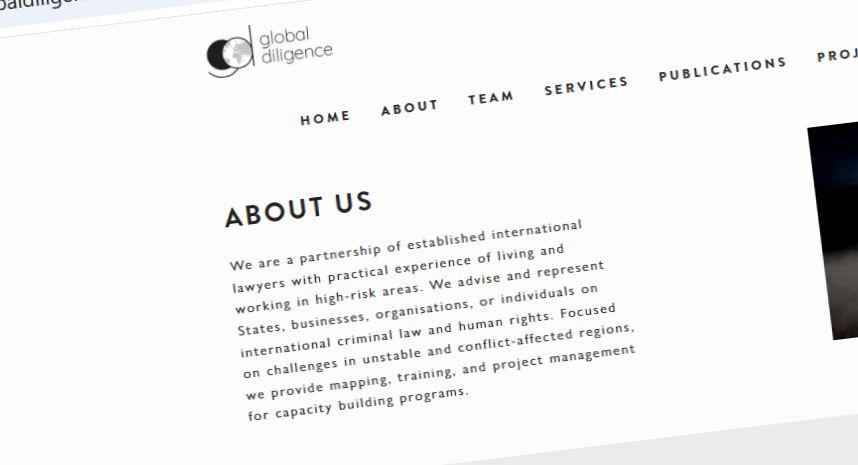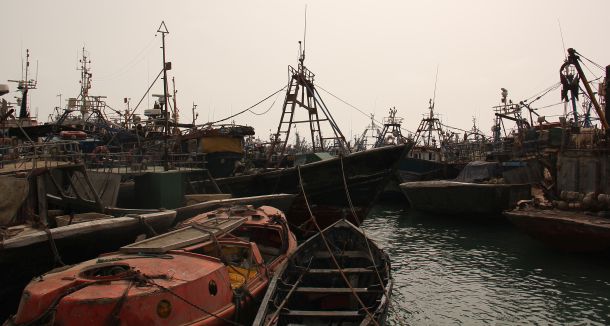
A Norwegian-controlled ship is now offloading Chinese wind turbines in the Canary Islands. Grieg Maritime says that its routines did not detect that the mills were to be installed in occupied Western Sahara.
All images in this and videos in this article can be used freely. Click "download" for high-resolution versions. In some of the pictures you can see in the foreground piles of the easily recognizable wooden boats that African migrants use to get to the Canary Islands.
Western Sahara Resource Watch (WSRW) has received photos taken yesterday, 12 October 2023, of the Norway-controlled vessel Star Lygra, lying inside a closed port facility on Tenerife. The photographs show giant masts and blades being offloaded. After a couple of days in transit in the Canary Islands, the mills will be transported further in a smaller cargo ship on the short voyage to occupied Western Sahara.
There, the components will be used by the Moroccan authorities for a project that will lead to the settlement of large numbers of Moroccans in the territory.
Grieg Maritime, and its operating company G2 Ocean, have routines to prevent their ships from calling in Western Sahara, and the shipping company admits that they were caught a bit off guard.
"We have routines which ensure that our ships do not sail to Western Sahara", communications manager Sveinung Tvedt wrote to the Norwegian Support Committee for Western Sahara.
"This is laid down, among other things, in the charter parties that govern how our commercial arm, G2 Ocean, uses the ships. At the same time, the routines have not been able to capture onward transport with other carriers well enough, and that is something we have already started to look at," he wrote.
The turbines are manufactured by the Chinese wind turbine manufacturer Envision Energy, which earlier this year was commissioned to supply the turbines by French company Engie.
Engie refers to the territory as Moroccan, and refuses to answer questions from WSRW regarding the operation. Engie's project is carried out in collaboration with the Moroccan company Nareva - owned by Morocco's King Mohammed. Engie's project consists of producing energy to power a seawater desalination plant, which in turn will irrigate gigantic and completely new agricultural areas in the occupied territory. A recently leaked environmental analysis documents that the projects will cause a large immigration to the area. According to the Geneva Conventions, Morocco is not allowed to move its own population into the area it occupies. But they do it anyway.
Star Lygra is the last ship in a fleet that has transported the twelve mills from China to the Canary Islands. Several of the components that have arrived in the archipelago since September have already been transported to Western Sahara during the past few days.
"Both customer and destination are assessed before we take on a transport assignment, and we have a list of destinations our ships should not sail to - Western Sahara being one of them. But the final destination of the item(s) is something G2 Ocean only occasionally asks about. The reason is that the vast majority of what we transport are raw materials or semi-finished products, and this will be sent on to countless places after we have unloaded where we are going to unload. Ownership of the cargo can change both while it is on board our ships and after it has been unloaded. As a result, very often our customer cannot say with certainty whether and whereto the load will be transported," Tvedt explained.
"In the booking note that was sent to G2 Ocean, it does not say anything about the cargo being forwarded, and the field about forwarding in the bills of lading is also blank," the shipping company states.
Grieg Maritime explains to the Norwegian Support Committee for Western Sahara that Star Lygra is owned by Chinese CMBFL, leased on a so-called bareboat to Grieg Shipping II (part of Grieg Maritime Group). GMG's Grieg Star has ship management, while G2 Ocean is a commercial operator. The ship left the port of Taicang in China on 30 August 2023.
Grieg Maritime clarifies that G2 Ocean - which is partly owned by Grieg - has the same position regarding Western Sahara. "The charter parties are clear that our ships are not to sail to Western Sahara, and this is also in the routines of G2 Ocean", the shipping company said.
G2 Ocean is the joint operating company of Grieg and Gearbulk. The latter shipping company was for a number of years heavily involved in transporting conflict minerals from occupied Western Sahara to New Zealand until around 2012/2013. No Gearbulk transports have been reported since then.
















Since you're here....
WSRW’s work is being read and used more than ever. We work totally independently and to a large extent voluntarily. Our work takes time, dedication and diligence. But we do it because we believe it matters – and we hope you do too. We look for more monthly donors to support our work. If you'd like to contribute to our work – 3€, 5€, 8€ monthly… what you can spare – the future of WSRW would be much more secure. You can set up a monthly donation to WSRW quickly here.
New controversial energy infrastructure to be built in Western Sahara
The Moroccan government has opened for a relatively large tender in Dakhla.
Global Diligence defends operations on occupied land
The legal advisory firm Global Diligence, which presents itself as expert on ‘heightened due diligence’, misrepresents international law in occupied Western Sahara.
First overview of gas imports into occupied Western Sahara
50,000 tonnes of liquified gas arrived in occupied Western Sahara last year, according to our first overview of this key trade.
New report: Western Sahara phosphate trade halved
The export of phosphate rock from occupied Western Sahara has never been lower than in 2019. This is revealed in the new WSRW report P for Plunder, published today.



